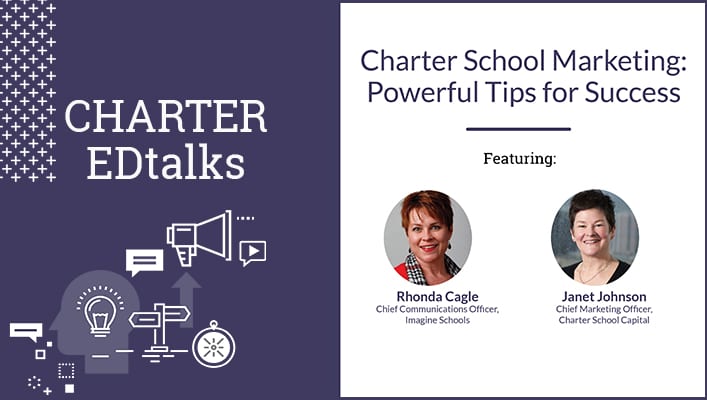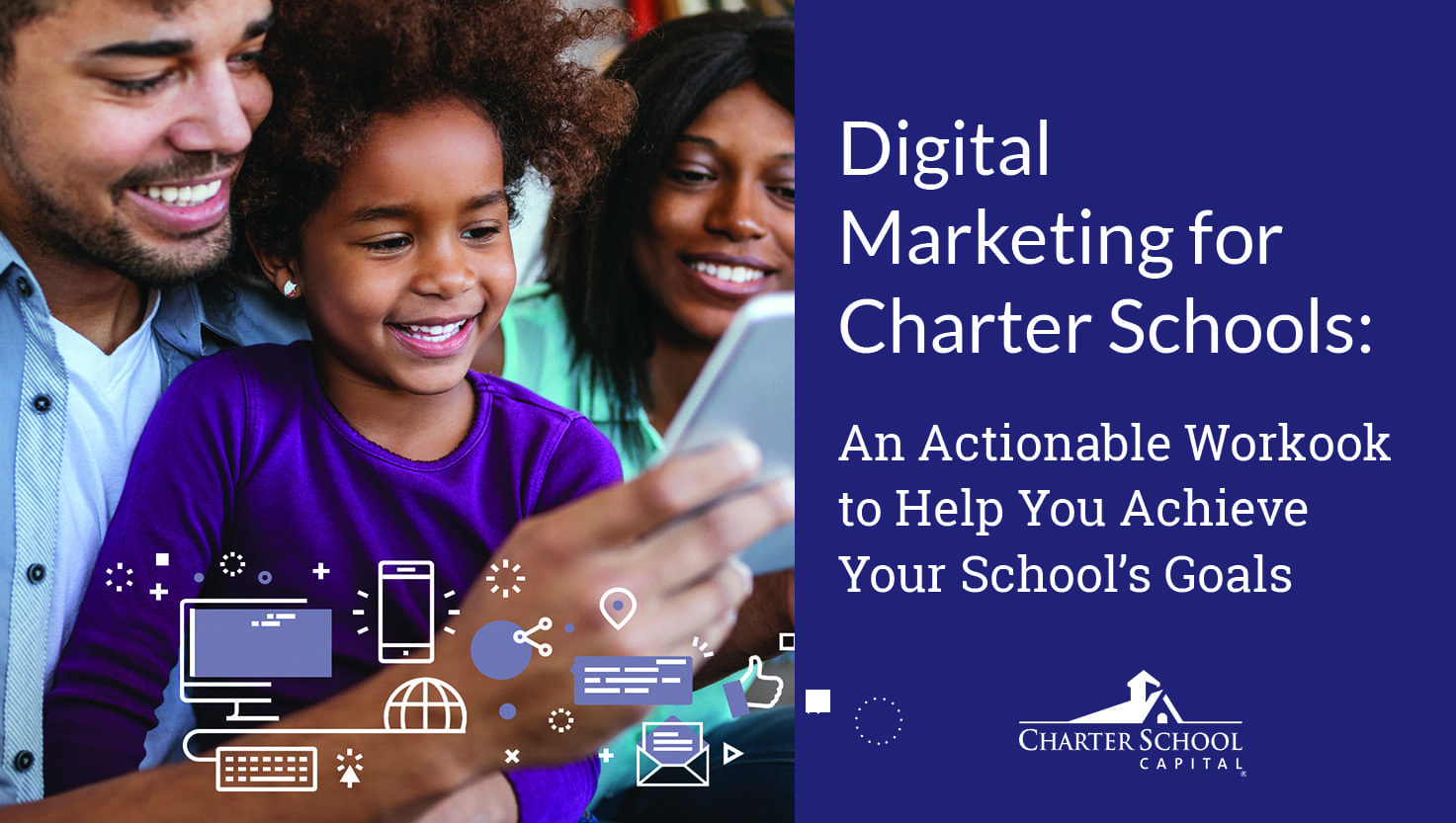 Charter School Marketing: Powerful Tips for Success
Charter School Marketing: Powerful Tips for Success
Editor’s Note: In the ever-changing world of marketing – and more particularly digital marketing – we understand the importance of keeping up-to-date on the best ways to reach prospective students, their families, and communities. That’s why we wanted to sit down with Imagine Schools‘ Chief Communications Officer, Rhonda Cagle, to get her insights and tips on charter school marketing. Rhonda generously shares her perspective on quick wins and strategies for marketing success!
We think it’s vital to keep tabs on the pulse of all things related to charter schools, including informational resources, and how to support charter school growth. We hope you find this—and any other blog post we write—both interesting and valuable. Below you will find the video and the transcript. Please read on to learn more.
Janet Johnson (JJ): Hi there, welcome to Charter Ed Talks. I’m honored to be here with Rhonda Cagle who is the chief communications officer for Imagine Schools, which is a network of non-profit public schools and welcome.
Rhonda Cagle (RC): Thank you so much for having me.
JJ: And we’re going to be talking about marketing today. I’m pretty excited about this subject because we’re both marketers and we’ve both been relatively new to the charter space. How long have you been in the charter space now?
RC: Full time, I’ve been in the charter space five years.
JJ: Oh well, you’re a lot more senior than I then. Rhonda, we’re doing kind of a fun campaign called “We Love Charter Schools” and so can you tell our listeners whatever you’d like to say about what you like about charter schools. Why do you love charter schools?
RC: I love charter schools because charter schools change the lives of children. We see that when children have the opportunity to learn in an environment that best meets their unique individual needs, their lives change, their ability to learn and to become successful changes. We also see that the communities become successful. The schools become literally beacons of hope in the neighborhoods in which we serve. I love charters because they change lives.
JJ: That’s fabulous. Not much better than that. From a marketing perspective and a lot of our audience I hope will be charter school marketers on these videos, are there any surefire wins that we should be employing today for enrollment or other charter school marketing?
RC: I think there are several surefire wins. The first is to recognize that marketing is really about relationships and it’s really about maintaining those relationships. We don’t do that in our personal lives once or twice a year, we don’t have a relationship push, we have ongoing relationships and that’s really what marketing needs to be about for charter schools. We need to be in our communities and sharing our news and what we’re doing in the lives that we’re changing, we need to share that all year long, day in and day out. The other surefire wins is the little things. We talk a lot about how do we attract families but I also like to ask the question how do we retain our families? Because I think retention is a lot like dating our spouses. We have to remind our spouse why they fell in love with us in the first place and we have to make sure that we are continually reminding them of why we are their best choice.
JJ: Those are very important points. Can you tell us a little bit about the role digital marketing plays in the charter school landscape from your perspective?
RC: Absolutely. Digital marketing has become something that we as a network are relying more and more on. It used to be that if you built it they would come and the truth is that was true for a while and then the charter’s base grew and we did build and they did come. And so now we have to find a way to differentiate ourselves in the market. And digital marketing helps cut through the noise that’s out there and it helps reach parents and families where they’re at.
We started our digital marketing campaigns back in late 2015, 16. We had our first full year of results in the 16-17 school year. What we found is that we generated roughly 6200 qualified leads. And that was through either online inquiries, somebody saying yes I would like to know more or a phone call that we could track. And out of that, we were able to convert 751 new enrolled students.
JJ: That’s a nice conversion rate, actually, in my experience.
RC: Thank you. We believe it can be better but that was our pilot and so now what we’re working on is how do we get those numbers tighter and better and those returns greater. Not just because it’s obviously good for running charter schools effectively and efficiently but more importantly because it maximizes resources coming into the schools that best support students. When a school is fully enrolled that school has the maximum resources that students need in order to learn and be successful. So we’re really working on closing those gaps to make sure that we’re being as effective as possible.
JJ: The fact that you’re maximizing the resources for the students through marketing I think is a really interesting point. Most of us feel as if we just need to get the students in the door, right? So that we can grow but I like the positioning of maximizing the resources for the children, the scholars, the students themselves and the families and the communities you serve. I love that. Are there any, especially in the digital world there are a lot of memes that come and go, right? Have you experienced any kind of, oh don’t go there because or are there myths that you would like to kind of bust right now for our viewers?
RC: Sure, so I think there’s a lot of myths that are out there. A lot of people are slow to think about digital, a lot of people want to hold on to what worked well in the past and the truth is what worked well in the past did work well but now it’s incomplete. And just like we keep learning how students best learn we also keep learning how our audience, our potential audience best engages with the message that we have to deliver. And so we have to be willing to learn and grow and change.
JJ: I think that’s important. And so, isn’t it exciting to be in a field where not only are you serving a wonderful mission but you are learning every single day about what works and what doesn’t work?
RC: Absolutely. I think the other piece of that is often we want to tout what we know as educators is important for a student. We want to talk about a curricular approach, we want to talk about those kinds of quote-unquote “selling points” and in many cases, we need to put ourselves in the shoes of our audience and what’s important to a parent may not be what we as educators consider to be important. For instance, we have many parents who come into our schools because they know their children are safe.
JJ: Really?
RC: They know their children are well known as an individual and they know that they’re going to be valued as an individual, and for the parent that’s their selling point.
JJ: Those are the messages that they want to hear.
RC: That’s right, and so we have to continually think about how are we adapting our messaging? How are we putting ourselves in the shoes of our audience so that we’re connecting with them in ways that are meaningful?
JJ: Are there any kind of surprises that have come up in your recent research or studies as you’ve learned more about the marketing to parents and students? Are they any different? Are there other things, other little pearls of wisdom you might share?
RC: Well I think it’s interesting to know that there is still so much misinformation about what charter schools are. So for instance, I just became aware of some polling that was recently done and when you put the word “public” in front of charter schools it increases favorability and understanding by two to three points. So there’s still fundamental misunderstandings about what charter schools are. The fact that they are public schools, the fact that they cannot discriminate in terms of how we enroll. We have to continue to be vigilant in delivering that message because there’s a lot of the public that still does not understand what a charter school is and the value that charter schools bring to the community.
JJ: Well, I must thank you again for the pearls of charter school marketing wisdom you’ve shared with us today. And, in terms of continuing education, I think this is going to be a little gem that others will be able to appreciate as a result of your willingness to share with us.
RC: Thank you so much for having me.
JJ: Thanks, Rhonda.
 Digital Marketing for Charter Schools: An Actionable Workbook to Help You Achieve Your School’s Goals!
Digital Marketing for Charter Schools: An Actionable Workbook to Help You Achieve Your School’s Goals!
Scratching your head as to how to go about implementing digital marketing programs for your charter school? You’re not alone! This free manual will be your go-to guide for all of your school’s digital marketing needs! Download this actionable workbook to help get your marketing plans started, guide you as you define your audience and key differentiators, choose your tactics and start to build your campaigns.